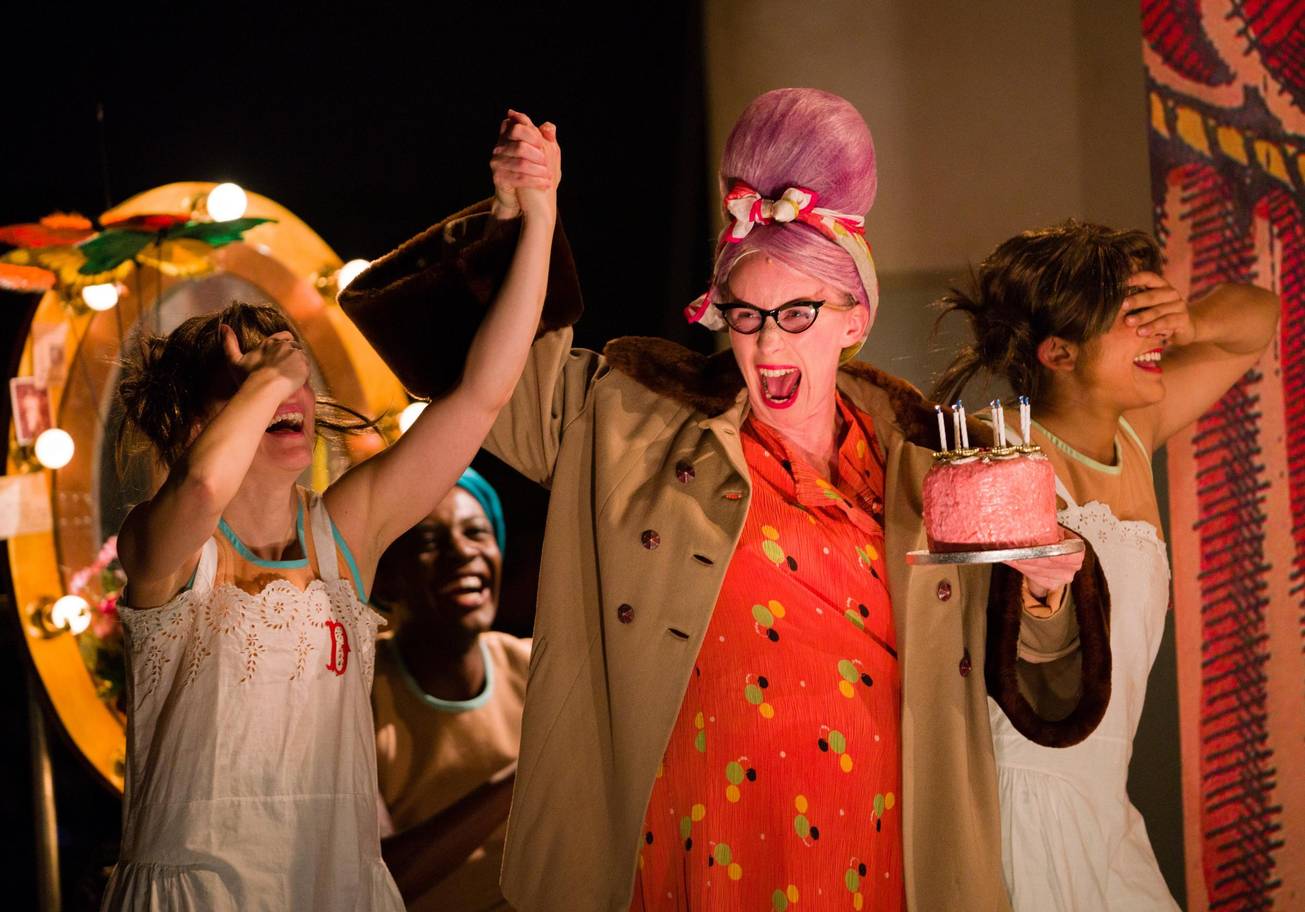Show me a stage curtain and my heart pit-a-pats with anticipation. They’re a rarer sight nowadays, but if I’m sat in front of some plush red folds before an opera or ballet, I’ll stare and stare throughout the overture, alert for every telltale twitch, jiggling with longing for the curtain to rise and the show to begin.
Is a curtain – that fabric lodged in the fabric of the building – a prop? Usually, no; but Vicki Mortimer’s design for Wise Children – adapted from Angela Carter’s deliciously rorty final novel – includes mobile pictures of stage curtains of various sizes, from toy-theatre miniature to human-height-plus. Identical in all but scale, they present the very quintessence of curtain: licks of pale strawberry and lime on a buttery background, replete with swagging and frogging, with loops of rope and ruching, with braid, bows, tassel and fringe.
For Dora and Nora Chance, Carter’s rackety geriatric twin heroines, theatre is in their blood and in their disputed bloodline. Through their careering career as stage-struck tots and hoofing double-act, there’s nothing more reliably shiversome than the sight of a curtain ready to give them a show or reveal them to an audience. In Emma Rice’s loving adaptation – so intense is her affection that her new company takes its name from the novel – that freestanding curtain can mark the passage between one pair of actors playing the them and the next. They’re cast across gender, colour, accent and body shape: raucous biddies are onstage throughout as their older narrating selves, but soft little bubs disappear behind the curtain and emerge as hoofers in Louise Brooks bobs and legs so long they outlast their fitful careers.
The swish of the curtain
Carter’s chronicle is an unreliable history of 20th-century performance, low and high in perpetual jostle. Temple of Shakespeare and seedy revue; Brixton panto and Hollywood movie; swank West End spectacle and pierrots working the end of the pier. The novel is patchworked with quotes from Shakespeare and music hall, each colourful scrap quilted into a companionable snuggle. Rice can’t find space for them all, but packs in old, new, borrowed and blue in poignant song and jaunty dance. Whether upscale or down at heel, the venues summoned by this 20th-century foxtrot have one thing in common: the swish of the curtain, marking time and dissolving it in wonder.
Whenever a curtain rises, something magical (or calamitous) occurs. You see something delectable, or something you shouldn’t. Sometimes you glimpse something sweetly romantic or altogether scandalous (Lin-Manuel Miranda recently observed that British audiences are alert to all things saucy, and our popular entertainments are always gagging to get their titters out).
It’s a wise child that knows her own father, conclude the so-called lucky Chances. A wiser yet that makes her way in the world without reference to a whiskery progenitor. For Nor and Dor, performance is slightly more reliable than family. Product of unwed bedwork, they’re disowned, covertly admitted, finally acknowledged by their relatives the Hazards – legitimate in cultural aspiration if not always in procreation. Family is what you make it – a roistering adopted gran, a notional uncle who swoops up bearing treats. And each other – always, unswervingly, each other.
Rice might easily have fallen out of love with theatre after being unceremoniously ousted from Shakespeare’s Globe – not legitimate enough for a temple of the arts, perhaps. But if Wise Children is a guide, she’s fallen even deeper in, the dusty razzle-dazzle winding around her heart. Hope for the best, as Grandma Chance says, but expect the worst. The curtain always rises. The curtain always falls.
Photo: the edge of the curtain (far right), with Bettrys Jones, Katy Owen, Mirabelle Gremaud. Photo: Steve Tanner
Follow David on Twitter: @mrdavidjays


Leave a Reply